I don’t know if you are like me, but sometimes I like to go out of my way to watch a movie that I know will slightly mess up my day. Like I know for sure that I won’t walk away from it being like, “Hey I feel great now, who’s up for some tacos?” and I kinda…like that feeling? Sure, I can always go for a happy-go-lucky, low stakes kinda movie. Just ask me why I spent my Valentine’s Day alone, in a movie theater, watching Love Hurts.1 But sometimes I just need to feel something, you know? Like have a movie stick with me for a while and make me think about some things, and second guess my opinion on other things. This is exactly what A Real Pain does – but let’s get one thing straight; this movie is not flawless, and it does not work for everyone. Just the small collection of my Letterboxd follows alone had reviews ranging from two to four stars, with some people really into it and wanting more from Jesse Eisenberg’s directing career, while others felt it wasn’t for them and didn’t really hammer any of its purposes home. But this is what makes movies (and all art, really) so fun and interesting! One person’s trash is another person’s treasure.
Let’s go back to that criticism real quick – the one about how A Real Pain doesn’t really wrap everything up very nicely and the ending can leave people saying, “Wait, what? Is that supposed to mean something?” Personally, I don’t really think it means that much – or at least, not in an overarching thematic sense. For me, it was symbolic more of Kieran Culkin’s character and the journey that he is currently going through in life. We open the movie with a long, winding shot of him sitting in the middle of JKF Airport casually looking around at other people and not saying anything. We eventually move on to our introduction to Jesse Eisenberg’s character with little to no pomp or circumstance. At the end of the movie, after everything the two of them go through (trying to keep this as spoiler free), we leave Culkin’s character once again in a long, winding shot of him sitting in the middle of JFK Airport casually looking around at other people. What does this mean? For one, it is full circle in that we end the movie on the same shot we started on (but at different times, it’s not like one of those movies that shows you the end at the beginning), which I liked. But to me, more importantly, it shows that Benji can light up a room and be as charming as he wants to be when he turns it on, but sometimes he can also be incredibly lonely and want to just exist within the hum of other people. Maybe he is exhausted by being himself sometimes, or maybe he is still so lost with what to do after the passing of their grandmother. Or maybe he’s just homeless – which, by the way, is some more interesting food for thought. Either way, it leaves things open-ended, and not all wrapped up in a pretty bow – which some people don’t enjoy.
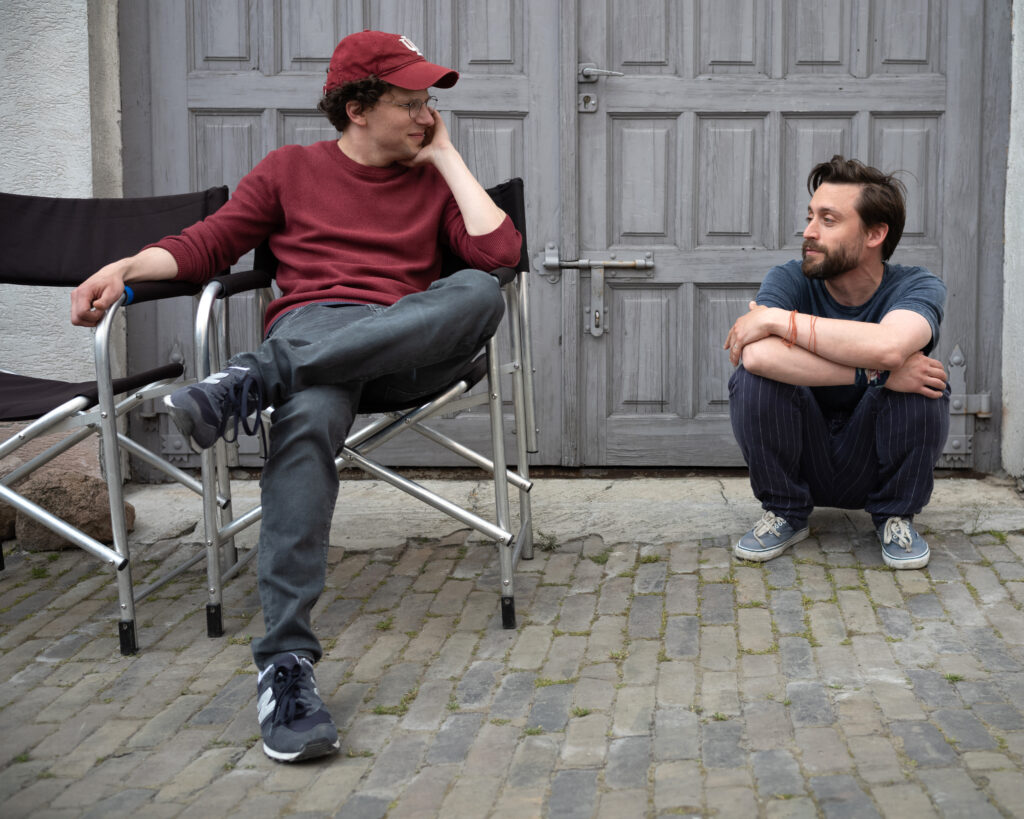
Personally, I think it is much more interesting, fun, and brave to not answer all of the questions by the end of a movie. Why should they? This is a movie about a very real and very relatable experience for these two cousins, which means there is no way they would get back from Poland in real life and just feel honky dory about everything they went through. They would still have a lot of questions, there would still be some weird vibes between the two of them, and they would probably go another six months without talking to each other. It is meant to make the viewer uncomfortable and feel awkward about almost every scene – and I like that! It just feels like a very genuine kind of storytelling that feels fresh and different to me every once in a while.
Okay, let’s shift gears here and talk a little bit about our two boys – Jesse Eisenberg and Kieran Culkin. Who do you want to talk about first? Jesse? Because I wrote his name first? Sounds good. This is Jesse’s second time directing a feature film, following up on his debut with 2022’s When You Finish Saving the World. Eisenberg has received quite a few nominations for also writing the screenplay for the film, including Best Screenplay at both the Golden Globes and Academy Awards. He also stars in the movie for what I described as the most relatable Jesse Eisenberg character that I’ve ever seen. I mean think about it – what other roles is he known for playing? Lex Luthor in Justice League, Columbus in Zombieland, J. Daniel Atlas in Now You See Me, and Mark Zuckerberg in The Social Network. Not the most relatable group of guys. But a middle-aged guy with a small family, a boring job in advertising, a prescription for anxiety, and a cousin he’s sometimes embarrassed by? Uh yeah, I’ll take “that sounds familiar” for 500 please Alex. Instead of being the awkward and socially weird billionaire who started arguably the most important website of all time, he’s playing the awkward and socially weird guy who lives in a third floor walkup in Midtown that is gonna have some weird stories for his coworkers about his PTO that he probably won’t end up sharing. It was just nice to see him in a role that was relatable, relatively likable, and someone you’re (mostly) rooting for throughout. And he did a great job with the directing too! I’m not filmmaker so I can’t sit here and tell you the ins and outs of why he shows such promise as an up-and-coming director in Hollywood, but I can tell you I liked the pacing of the movie, he seemed to gel really nicely with his cinematographer, and I liked a lot of the choices that he made. Okay, time to talk up Kieran Culkin.
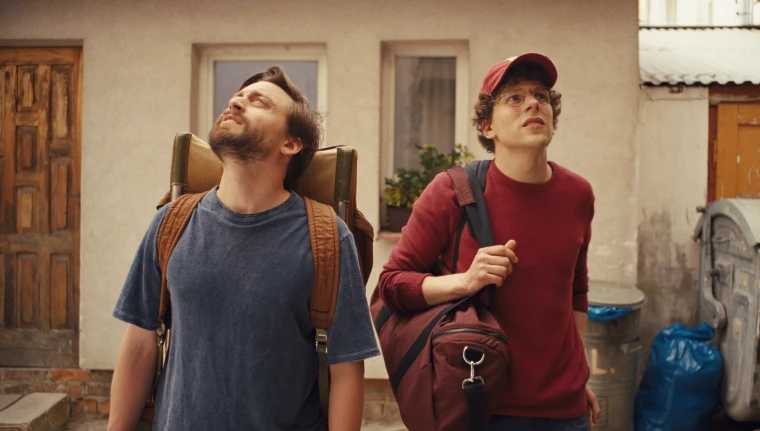
If you somehow weren’t familiar with Kieran Culkin’s work before this movie (Home Alone, Father of the Bride, Scott Pilgrim vs. the World, and Succession just to name a few), I’d sure hope that after watching A Real Pain that you understand why he’s not only become such a beloved name in Hollywood but also why he’s becoming an award-winning name. He was rightfully nominated for both an Oscar and a Golden Globe (which he won) for Best Supporting Actor, along with more wins at the British Academy Film Awards, the Critics’ Choice Awards, the Astra Awards, the National Board of Review Awards, the Satellite Awards, and many more. His performance in A Real Pain is haunting yet endearing, charismatic yet restrained, and most importantly, just really freaking good. We’ve all met someone like Benji and moreover, we probably even have someone like him in our circle of friends (please don’t read into that). One moment he’s making sure to check in on the recently divorced Marcia, and the next he’s telling David “We really shouldn’t be talking about her behind her back.” David was just trying to make conversation with Benji and ask how Marcia is doing since he talked to her, but Benji is putting David down for trying to put his nose where it doesn’t belong (only after having offered up all the “juicy goss” just seconds before). And it’s this dichotomy that makes Benji such a fascinating character that is a dual threat: it shows the strengths of both Eisenberg’s writing and Culkin’s acting. Another small moment that really hit this home for me that immediately stuck out to me: when the tour group is walking around Poland on the first day, David and Benji are walking together and talking when Benji notices the aforementioned Marcia walking by herself. Benji points this out and says he feels bad for her and that they should go talk to her; David responds with typical social awkwardness by saying it would be weird to just go up to her and start talking to her, and maybe she wants to be walking alone. Benji responds by saying “Come on man, nobody wants to walk alone.” And then proceeds to run up to Marcia and strike up a conversation…leaving David to walk alone. There are a couple moments like this throughout the movie that are so small and can be easily missed, but they are so important to developing Benji’s character and building to David’s eventual breakdown at the dinner scene late in the movie. Culkin does such a wonderful job embodying the double-edged sword persona of Benji by getting you to love him and immediately be smitten when he walks into a room but also being so confused and even flabbergasted by his outbursts at random moments. It really is something special and he is deserving of every single award he was nominated for.
With that being said, let’s Kraków on2 with the categories!
By the Numbers
- Release date: November 1, 2024
- Budget: $3 million
- Box office: $19.6 million
- Run time: 90 minutes3
- Letterboxd rating: 3.8 ★
- My Letterboxd rating: 4.0 ★
- Rotten Tomatoes: 96% (Certified Fresh ?)
- Accolades: 155 total nominations, 74 total wins
- 2 Academy Award nominations (Best Supporting Actor, Best Original Screenplay)4
- 4 Golden Globe nominations (Best Motion Picture – Musical or Comedy, Best Actor – Motion Picture Musical or Comedy, Best Screenplay, Best Supporting Actor), 1 win (Best Supporting Actor)
- Two: This is Jesse Eisenberg’s second feature film that he has directed
Best Scene
Spoilers ahead! I want to talk about these scenes so if you haven’t seen the movie yet and don’t want spoilers, skip ahead to the Jason Clarke Award.
- No One Wants to Be Alone: I kinda already talked about this scene, but it’s the one where the group is walking through Poland on their first day of the tour. Benji abandons David to talk to Marcia because “no one wants to be alone” and yet he leaves his cousin all alone. This scene really gives us the bread and butter of both David and Benji as individuals, but also their dynamic together. This culminates with Benji wanting to pose with the statues of the Warsaw Uprising, while David finds it to be in poor taste and disrespectful. David ends up with everyone’s phones taking pictures of the whole group but himself because he is too uncomfortable to pose, and Benji swooned his way into everyone playing his little game of pretend.
- The Train to Lublin: Another scene where we really get into the uncomfortable facets of Benji’s mind and his erraticness. The group is riding First Class on the train to Lublin, when Benji speaks his mind about it feeling wrong for them to be living in luxury as a group of “Jews on a train in Poland.” Benji points out the incongruity of traveling First Class on a Holocaust tour and how “80 years ago we would have been herded into the backs of these things like cattle.” It’s one of those moments that says the quiet part out loud, and forces the viewer, along with the rest of the characters, to confront how they really feel about commercializing the Holocaust, and the tourism industry as a whole. How do you properly honor those who suffered through those terrible years, without being disrespectful or ironically profiting off of it? More delicious food for thought.
- The Dinner Scene: Another one that we’ve already touched on but certainly needs to be on this list. You could probably consider this the climax of the film, with everything coming to a head for David. Benji has another outburst at the table, and boisterously leaves to use the restroom. David takes this time to not only apologize for his cousin’s actions throughout the tour, but also to get some things off his chest. This is Eisenberg’s time to shine, and he nails it – not only because he does a great job with portraying the combating feelings that his character has about his cousin, but also because as a writer, he doesn’t let David be totally in the right. There are some very valid points brought up by David, but he also uses the opportunity to speak down on Benji and put a voice to what we all can see is him viewing himself as better than Benji.
- Placing Rocks on Grandma’s Stoop: No link for this one, so you’re just going to have to watch the movie yourself or use your memory recall. This is definitely the most stereotypically heartwarming scene in the movie – it’s right at the end, the big fight is behind us, and the characters are having one last experience that brings them together. This scene is also kinda the perfect microcosm of the entire movie: there is some very real and touching drama of them finally seeing their grandmother’s childhood home that she was forced out of by the Nazis, but also some very real and lighthearted comedy when they are interrupted by a Polish neighbor who questions them and tells them they are being reckless. It just feels real – sometimes you try to do something poignant and important, but your bubble is burst when someone walks by and says “Um hello, you can’t just put stones on the doorstep. An old woman lives there, and she could trip on them and hurt herself”, and you have to immediately snap out of it.
There are some other great choices (the final scene in JFK, their walkthrough of Majdanek, Benji’s outburst in the cemetery), but these were tops for me. My winner here is the Train to Lublin scene – it is such a good combo of the acting on display from Eisenberg and Culkin, but also the directing and writing from Eisenberg to tie it all together. It gives you the most to think about of all the scenes in the movie, and challenges it’s viewers the most without being over the top (although some people might say it is a bit too on the nose, but I disagree).
What’s Aged the Best
This movie came out like three months ago, so hard to really say at this point. I can say, however, that their decision to actually film on location in Poland will end up aging quite nicely. It’s a no-brainer really, but it’s still a really good choice to make. Poland has a lot of beautiful cities and obviously quite a storied history, so it was only right that we were actually there. The choice to have Jesse Eisenberg play the character of David instead of Benji will also age well. Eisenberg’s first choice was to play Benji, but his crew and friends steered him away, saying that it would be a dangerous game to play such an ‘unhinged’ character while also directing the film (I also just think Eisenberg wouldn’t have brought the right energy to the character). We will touch on this in a little bit, but hiring Michał Dymek as the cinematographer was a great decision as well; Dymek was born and raised in Warsaw and his deep knowledge of his hometown helped create some really great shots for the b-roll and montages throughout Poland.
What’s Aged the Worst
As of now, nothing really. Time will tell obviously, but the only real questionable thing that comes to mind is actually the casting of Kieran Culkin. Eisenberg was quite torn on casting a non-Jewish actor for the role of Benji (especially when that plays such a crucial part in the story), but ended up feeling comfortable with it, saying, “I have 17,000 thoughts about this, and where I come out is he gave me an amazing gift by helping to tell this story that is very personal for my family.”5
The Jason Clarke Award (What’s Their Name Again?)
This film features an incredibly small cast, with there only being 15 total credited actors on the IMDB page. We are all obviously familiar with the two lead actors, but I personally only recognized one other person in the movie, who fits this category perfectly. I’m talking of course about Will Sharpe, who plays the role of tour guide James (and does a great job I might add). Most people will recognize him from his work as Ethan in the second season of White Lotus, which was my thought exactly when he popped up on the screen for the first time: “Hey, it’s the guy from White Lotus!” Congrats, Will!
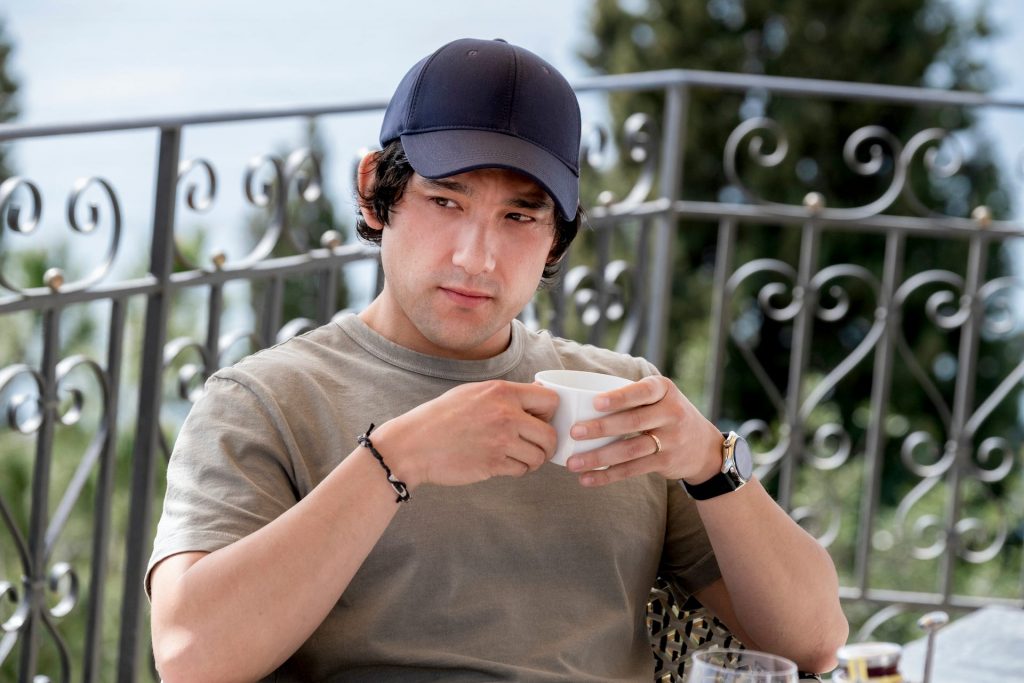
The Jack Nicholson Award (Big Impact, Small Role)
Seeing as this movie has a very small cast, and the majority of the cast is featured in the entire film, it is pretty hard to choose someone who had a small enough role, but large enough impact. If this wasn’t one of my favorite categories, I might have skipped it entirely for this movie, but I just can’t do that. For that reason, I am having a little more fun with this one and saying that the winner is Marek Kasprzyk for his role of ‘older man’. He is the old man I referred to earlier, who yells at the main characters in Polish for haphazardly placing stones on the stoop of an old woman’s house. It’s really not much, but it provides for some good comedy at the end of the film and also, there wasn’t really anyone else to choose. So, deal with it. Congrats, Marek!
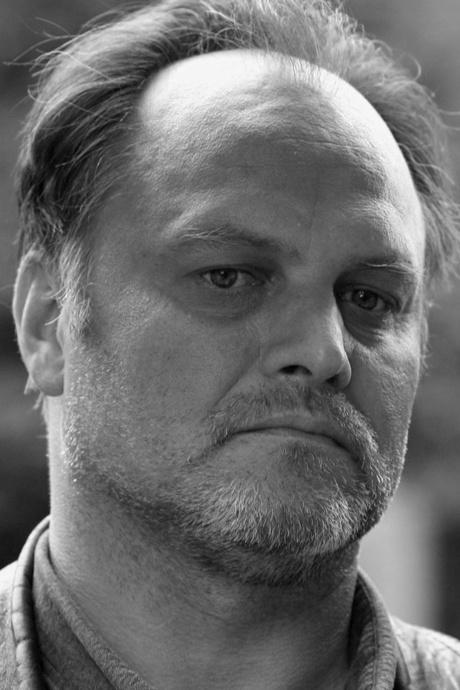
The Roger Deakins Award (Best Cinematography)
As mentioned previously, Michał Dymek was the cinematographer on this film and was seemingly born for this project. He had the hometown advantage of having been born and raised in Warsaw, which provided for the perfect accompaniment to Jesse Eisenberg’s vision for the film. Eisenberg had visited Poland back in 2008 with his wife, so he used his own pictures from the trip, along with the street view feature on Google Maps, to scout locations and plan out the stops on the tour that the characters would take.6 Dymek was then able to perfectly capture what Eisenberg was wanting, which left the viewers with some really beautiful shots throughout Poland that were also perfectly accompanied by the minimalist score, largely provided by Frédéric Chopin (also Polish). The color palettes chosen throughout also made for some striking (at times) shots, while remaining fairly muted throughout. I’m not wise enough to really speak to it, other than to say that it was really pretty to watch.



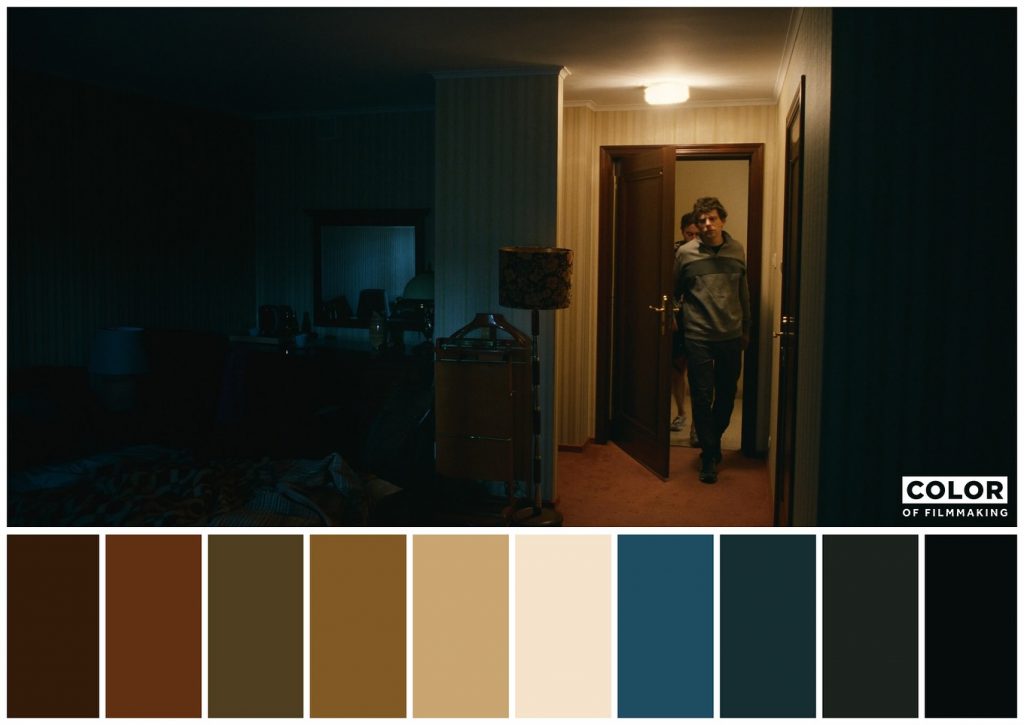




Trivial Pursuit
- Jennifer Grey, who plays Marcia and is herself Jewish-American, was overwhelmed when they were shooting in Majdanek; Eisenberg initially kept some of her legitimate reactions in the film but later cut them feeling as though it “disrupted” the tone.
- Eisenberg initially wrote the role of the British tour guide for comedian Richard Ayoade, but he turned down the role feeling as though he would have been a bad fit and his presence would have been too distracting.
- The soup that David and Benji eat is called żurek – it is made with sourdough and features a slightly sour taste; it is often eaten with bread and eggs and is traditionally served at Easter.
- The location of Benji and David’s grandmother’s house in Poland is where Eisenberg’s real-life ancestors settled in diaspora.
- Two weeks before filming began, Kieran Culkin attempted to back out of the project, saying that he didn’t want to be away from his family for that long. Producer Emma Stone eventually called Culkin and convinced him to stay on.
- Speaking of Culkin, Jesse Eisenberg had never seen something with Kieran Culkin in it before; he hired him based solely off of his “essence” and his sister’s recommendation.
- Eisenberg came up with the idea for the film after he saw an ad on his computer for a tour of Auschwitz with a complimentary lunch. He melded this together with a short story he had written for Tablet back in 2017.
- A Real Pain has a 96% rating on Rotten Tomatoes, making it the 31st-highest ranked film of 2024.
Six Degrees of Kevin Bacon
- Kieran Culkin: 2 (Culkin appeared in Home Alone 2: Lost in New York with Ally Sheedy, who appeared in She’s Having a Baby with Kevin Bacon)
- Jesse Eisenberg: 1 (Eisenberg appeared in Live in Front of a Studio Audience: “All in the Family” and “Good Times” with Kevin Bacon)
- Will Sharpe: 2 (Sharpe appeared in The House with Helena Bonham Carter, who appeared in Novocaine with Kevin Bacon)
- I checked all the major acting credits for this movie, and the highest number was two. The theory lives!
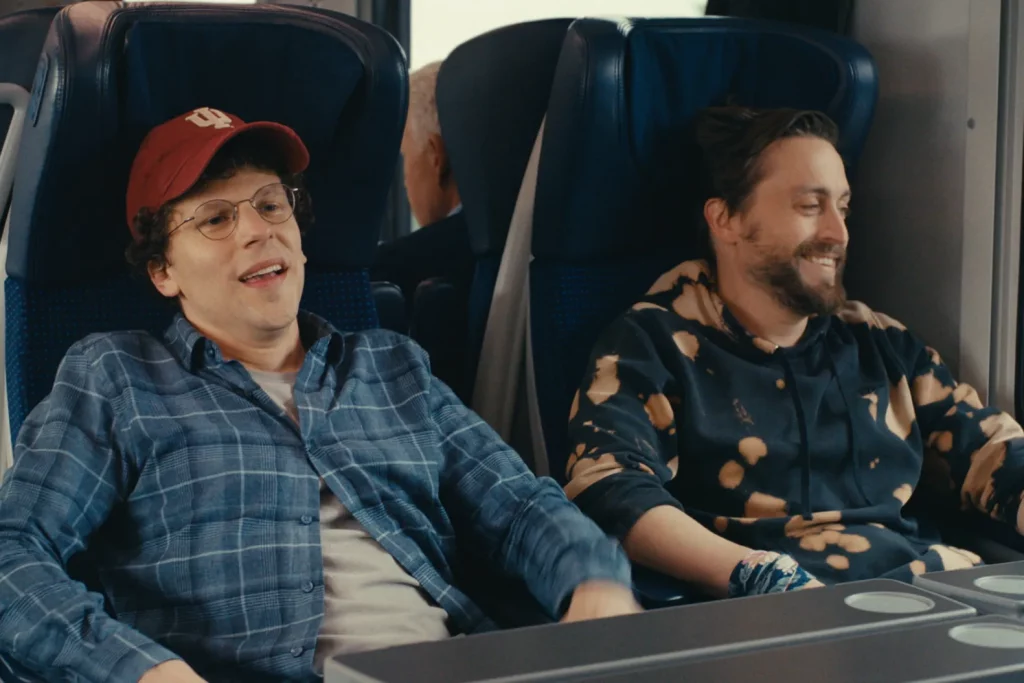
Concession Stand
We have a rare one on our hands folks – I would suggest not eating anything during this movie. Not only is it barely 90 minutes long, but the weight of some of the things covered in this movie can be hampered by the crunching of popcorn or clinking of silverware on a plate. Maybe a glass of a nice Polish wine, or if you’re really feeling hungry and need to eat, go for some pierogi or żurek.
Conclusion
This movie is not for everyone – there are a host of reasons why, but I ultimately think that the people who don’t enjoy it just need too much going on in their movies for it to be enjoyable for them. I think of movies like this to be in a similar vein to The Banshees of Inisherin or The Master of None; they are comedies, yes, but in a darker sense and they are surrounded by some deep and very real drama. There are punch lines, funny situations, and lots of social anxiety throughout, but A Real Pain also forces the viewer to deal with very real and tough morals, including the commercialization of Holocaust tours by the tourism industry. I, nor the movie, are here to tell you if it is right or wrong, because it isn’t really as simple or black and white as that. And I appreciate movies that tackle those grey subjects and give you grey answers as well; it is up to the viewer to decide where they land, but it is near impossible to walk away from this movie not at least questioning where you stand. Plus, it’s only 90 minutes long so you really don’t have many excuses for not at least giving it a try.
- That movie was super disappointing btw. ↩︎
- Get it? Like let’s crack on, but instead its Kraków because that’s a Polish city? Just forget it. ↩︎
- Chef’s kiss emoji ↩︎
- As of writing, the Academy Awards have not happened yet. ↩︎
- https://www.vulture.com/article/kieran-culkin-a-real-pain-interview.html ↩︎
- Eisenberg started writing the film during the COVID-19 pandemic, so he was also unable to scout locations in person. ↩︎


